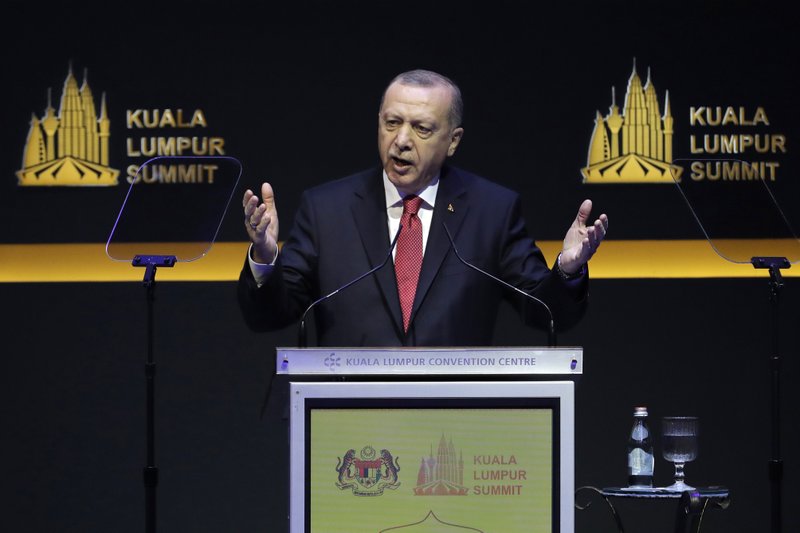
Turkish President Recep Tayyip Erdogan delivers a speech at the Kuala Lumpur Summit in Kuala Lumpur, Malaysia, December 19, 2019. Leaders from Turkey, Iran, Qatar, Indonesia and Malaysia address delegates during opening ceremony of the Kuala Lumpur Summit 2019, which aims to identify problems that affect the Muslim world. (Photo: AP)
Turkey's President Recep Tayyip Erdogan announced that his country is deploying troops in Libya to ensure the stability of the UN-backed government in Tripoli, a move aiming to influence the upcoming Berlin peace talks, experts said.
Erdogan said during a speech in Ankara on Thursday that Turkey is sending troops to Libya and it would use "all its diplomatic and military means to ensure stability to its south."
"In order to ensure the survival and stability of the legitimate government in Libya, we are now sending our soldiers to the country," Erdogan said days before a summit in Berlin on Sunday which will address the Libyan conflict.
"Turkey feels obligated to send soldiers immediately to help the internationally recognized Government of National Accord (GNA) of Fayez al-Sarraj as rebel forces are drawing closer to the capital," Oytun Orhan, a senior expert at the Ankara-based think tank Orsam, told Xinhua.
Last week, Turkey and Russia urged Libya's warring parties to reach a cease-fire. However, Khalifa Haftar, commander of the east-based army in Libya, did not sign the binding truce at the talk held in Moscow.
According to Russian media reports, at the indirect meetings with Sarraj in Moscow, Hafter insisted on an international monitoring of the truce in Libya without any involvement of Turkey, and the unconditional withdrawal of "mercenaries from Syria and Turkey."
"Before the Berlin talks, Turkey wants to be militarily involved in the conflict and possibly have the upper hand there," pointed out Orhan, noting that Ankara was pursuing a similar policy as in the Syrian crisis, where Turkey conducted operations and deployed permanent forces in its southern neighbor.
"Turkey's formula is to be active in the conflict zone and also on the negotiation table, they go hand in hand," remarked the expert, recalling the importance for Ankara of the maritime boundaries deal that it has inked with GNA late last year.
"If Sarraj loses, this agreement will be null and void, so in order to safeguard its vital energy and strategic interests in Eastern Mediterranean, Turkey is going in action," Oytun added.
The deal has upset Turkey's rivals in the region, namely Greece, Cyprus, Israel and Egypt, which have invested heavily in energy explorations in Eastern Mediterranean, seeing it as a move which could threaten their ability to export gas to Europe.
Ankara insists that the message sent by the bilateral maritime delimitation deal is clear that Turkey will not be ignored in the East Mediterranean.
In Libya, Russia and other countries such as Egypt and the United Arab Emirates are supporting Haftar via proxy forces.
Turkish Foreign Minister Mevlut Cavusoglu firmly denied this week reports that his country had given citizenship to Syrian fighters in exchange for their loyalty in Libya's conflict, amid social media reports on the presence of Syrian National Army (SNA) personnel in the North African nation.
"These reports are totally untrue," he said, semi-official Anadolu Agency reported. Both Ankara and the GNA have repeatedly denied the presence of Syrian fighters in Libya, as has the SNA.
"This could pose a problem for Turkey at the negotiation table, Western countries may accuse it of standing with and using jihadist forces in Libya," Orhan argued.
Meanwhile, while Turkey's military interventions since 2016 in northern Syria against Kurdish fighters had received overwhelming support from home, it is not the case for Libya.
However, a poll conducted in early January by big data analytics company Istanbul Economy research revealed that 58 percent of the Turkish population is against sending troops to Libya.


